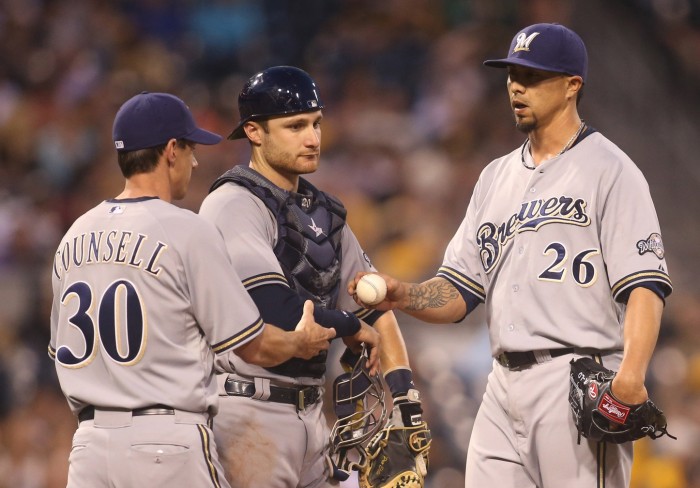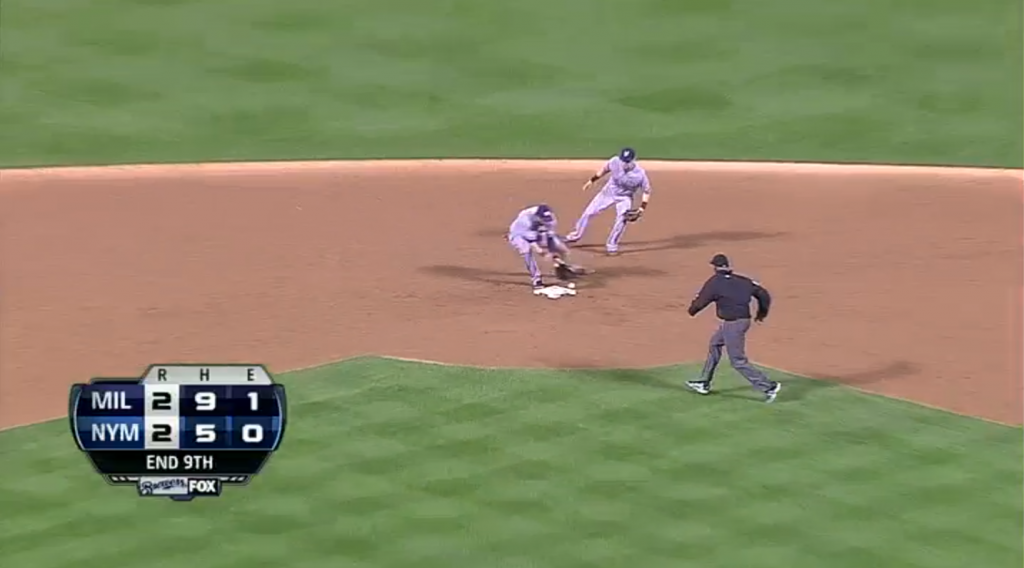After a rousing beginning to September, in which the Brewers gave Miller Park fans a sweep of the Pirates and won six of their first seven games, the Brewers have cooled down and dropped five of their past six. For a team that has been buried in the playoff race, there are far worse fates. Thanks to Major League Baseball’s silly and anti-competitive free-agent compensation rules, teams like the Brewers who have been out of it for months desperately want to avoid a late-season winning streak that brings them out of the bottom 10 of the league’s final standings and costs them a protected first-round draft pick in the winter.
A look at the league’s overall standings shows the Brewers’ recent swoon will probably be enough to keep them in protected pick territory. The Brewers now have the seventh-worst record as of Monday night’s action and are well behind the group of near-.500 teams clustering around the 10th pick. Anything can happen, but with only 19 games left, it will be tough for the Brewers to make up six games or more on at least four of the teams ahead of them.
BAL 69-73 +1.5
TBR 69-73 +1.5
SEA 69-75 +0.5
BOS 68-74 +0.5
ARI 68-75 +0.0
———
CHW 67-74 —
SDP 67-77 -1.5
DET 65-77 -2.5
MIL 62-81 -6.0
OAK 61-82 -7.0
MIA 61-82 -7.0
CIN 60-82 -7.5
COL 60-83 -8.0
ATL 56-88 -12.5
PHI 56-88 -12.5
Two years ago on September 14th, the Brewers were also 19 games under .500, at 64-83. Instead of limping home, the Brewers played their best baseball down the stretch and finished 10-5 in their last 15 games, second in the National League to only the Cardinals. The Brewers erased a three-game cushion between themselves and the final unprotected slot, managing to pass four different teams en route to finishing the season with the 11th-worst record (after tiebreakers) at 74-88.
The Brewers’ final series of 2013 was against the Mets, and they entered the series still one-game clear of the final unprotected spot—owned by the Mets themselves. Milwaukee was tied with three other teams for the ninth-worst record in the game. Whoever won the series would be at risk of losing their unprotected pick, and both front offices knew the stakes. After the Brewers rode a pair of first inning home runs to a win in the series’ first game, the bullpen usage got creative the next night.
With a 2-1 lead, the Brewers gave Donovan Hand not only the first save opportunity of his life, but a two-inning save opportunity, handing him the keys in the eighth inning and telling him to ride it out. The Brewers had their excuses—Jim Henderson, Rob Wooten and Brandon Kintzler had all pitched on consecutive days. But with a 40-man roster, giving the last two innings to a pitcher like Hand, a career minor leaguer with a fastball that barely touched 90 mph, is an extremely cynical play.
Predictably, Hand worked his way into trouble. After recording the first out, Hand walked two batters in a row, gave up a game-tying opposite-field single to Eric Young, Jr., and plunked Lucas Duda to load the bases for David Wright.
It was set up perfectly. Hand bounced the first pitch and almost gave up the game right there, if not for a brilliant backhanded play by Jonathan Lucroy. And on the second pitch, Hand grooved a fastball that Wright lined right back up the middle. It deflected off Hands glove, but somehow ricocheted directly to a waiting Jeff Bianchi at second base, who had a double play dropped right into his lap.
The Mets countered with their own bullpen disaster plan and sent out Scott Atchison for the 10th, a 37-year-old right-hander who had been faltering over the season’s last two months, over which he had posted a 4.50 ERA. Atchison quickly wilted, as he walked the first batter he faced and gave up a pair of singles to give the Brewers a lead; he would record only one out before getting the hook. The Brewers held on to the 4-2 lead to win the game and all but assured the protected pick would be going elsewhere, as they needed both to lose the next day and have four separate games to go their way to avoid finishing with the dreaded 11th-worst record.
Barring a ridiculous winning streak like the Scott Podsednik-fueled 10-gamer the awful 2003 Brewers pulled off, Milwaukee fans won’t have to worry about playing themselves out of protected position again. Finishing in the bottom 10 will allow Milwaukee to make a future-focused splash in the free-agent market without having to worry about stunting the growth of the farm system. It’s something the Brewers need if they’re going to pull off a quick rebuild, and something they haven’t enjoyed since MLB switched to its current system in 2012.
What happened to the Brewers in 2013 shows the absurdity of the free-agent compensation system. It leaves fans rooting against their teams and encourages managers to play to lose. It leads to tension between players playing for their reputations and their future jobs, and a front office that wants to save money and draft picks. All this on top of the royal screwing it gives to free agents like Kyle Lohse, who likely would have signed a richer contract with the Brewers earlier in the process had he not been weighted down by draft-pick penalties to teams that dare to sign him. It’s a measure that’s supposedly about helping teams compete, but for teams like the 2013 Brewers who finish in that dreaded 11-15th worst record range, all it does is dissuade them from spending money and competing in the short term. It’s a flawed system, and hopefully the players will be able to win one that’s better for everyone in future collective bargaining agreements.


Very true and well illustrated by your anecdote